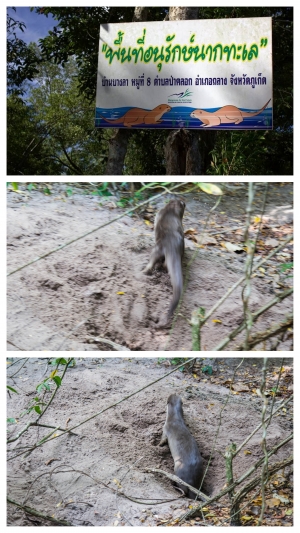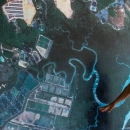Conserving mangroves for otters
Location: Phuket, Thailand. 23rd Mar 2013
Arun Bamrungna, head of Bang La Mangrove Conservation Group, in Phuket says, "My father told me that 30 years back otters were thriving along the coastline of Phuket island, in the South of Thailand". The booming of aquaculture based industries, such as shrimp farming became a major threat to mangrove ecosystems and caused the disappearance of otters due to habitat loss and poor water quality. The impact from shrimp farming not only affected the otter but the livelihoods of the local communities in the surrounding area.
Phuket has become a popular destination for tourists since then and rapid growth and urbanization has increased market prices of land due to escalating demands of the hotel business. Since the 1980s one third of mangroves were lost due to these threats. The conflict between local communities and investors has gotten worse due to the encroachment in Klong Bang La mangrove forest reserve. The communities have raised their voice and taken action against investors by destroying the machinery that cut down mangrove forests. Although some communities were able to reclaim the encroached area and declare it as community forests, several community leaders have been arrested in the conflict.
Mr Arun says, "Mangroves are very important to our livelihoods, as we grew up by the coastline with our main income being fishery.. mangroves also have cultural value to them". In order to protect the remaining mangrove forest in Bang La from encroachment, the community tried to use soft approaches such as involvement of youth groups in promoting mangrove conservation.
In 2009, the community launched a project called "Conserve Otter Habitat Through Mangrove Conservation" with financial support from Mangroves for The Future Small Grant Facility (MFF SGF). They selected the Otter as a flagship animal and as an indicator of healthy mangrove forest. In a recent publication by IUCN Otter Specialist Group, Syed Ainul Hussian[1] says the studies on the Asian otter is severely limited. Otters are the topmost predators in aquatic systems and their presence indicates the health of wetland ecosystems. Otters are listed in Appendix II of CITES. Thailand's Wild Animal Reservation and Protection Act, B.E. 2535, also lists otters as protected species[2].
The importance of the otter has been promoted in order to conserve and restore in habitat in Bang La mangroves. Since the launch of this project, at least 8 otters were spotted in the canals in the mangroves by fishermen. The group was able to capture the photos of a family of otters and confirmed it as the smooth-coated otter. Several signs displaying 'Otter conservation zone' can be seen put along the canals for raising awareness. The conservation group was able to establish community-based management of 192 hectares of mangroves and establishment of an alliance of 365 students and other residents of Phuket to protect mangroves.
More information about this project can be found at Restoring mangroves for nak thale (otters).
[1] http://www.otterspecialistgroup.org/Bulletin/Volume30/Hussain_2013.html
[2] http://www.verdantplanet.org/protect/protectedanimal.php



